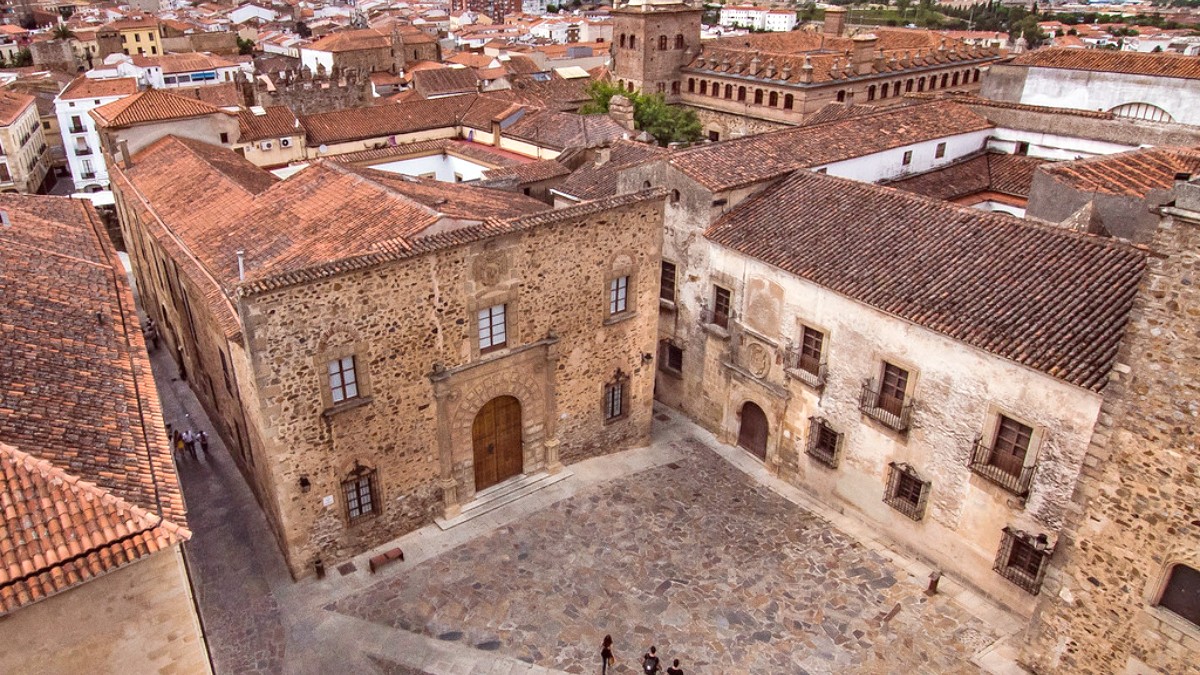
Extremadura, Spain
The city, located in Extremadura, features a Mediterranean climate with some continental traits. This means distinct seasons, each with different advantages and considerations for travelers.
Caceres summers, from June to August, are typically hot and dry. Average daytime temperatures range from 30-35°C (86-95°F), frequently climbing above 40°C (104°F) in July and August. Rainfall during these months remains very low, making for consistently sunny days. Winters, from December to February, are mild with moderate rainfall. Average high temperatures stay between 10-15°C (50-59°F), and lows generally measure 0-5°C (32-41°F). Frost can occur, especially in early morning hours.
Spring (April-May) and autumn (September-October) bring the most comfortable temperatures for extended walks through Caceres' cobbled streets and for exploring the Old Town.
Late winter to spring (February-May) offers the best time for observing breeding birds, including many raptor species, in Monfragüe National Park. Autumn presents excellent opportunities for spotting migratory birds. Temperatures are mild, and landscapes are green. If you wish to experience local festivals (e.g., Semana Santa, Womad), check specific event calendars, as their dates vary annually.
High Heat
Seek shade, stay hydrated, plan activities for early morning or late evening.
Midday sightseeing can prove uncomfortable. Increased crowds and prices.
Balanced Conditions
Carry layers, prepare for occasional rain, book popular tours ahead.
Chance of rain, but generally pleasant. Fewer visitors, better value.
Quiet Exploration
Dress warmly, plan indoor activities, check opening hours.
Cooler temperatures, but lowest crowds and best accommodation value.
Spain operates under the Schengen Agreement. Citizens of many countries, including the United States, Canada, Australia, and the United Kingdom, do not require a Schengen visa for short tourist stays. These stays permit up to 90 days within any 180-day period. This exemption applies for tourism purposes, business, or family visits. For stays exceeding 90 days, for purposes like work, study, or residency, a Long-Stay Visa is a requirement.
The application for a long-stay visa occurs through Spanish embassies or consulates in the applicant's country of residence, or via authorized visa application centers (e.g., VFS Global). Applying well in advance of your planned travel date is advised, as processing times vary. Always check the official website of the Spanish Ministry of Foreign Affairs or the embassy/consulate in your home country shortly before your trip, as regulations can change.
Valid for at least three months beyond your intended departure from the Schengen Area, issued within the last 10 years, and with at least two blank pages.
Complete this form accurately (if applicable).
Confirmed hotel bookings or a letter of invitation covering your stay.
Evidence of sufficient funds for your duration (bank statements, credit card limits).
Mandatory for Schengen visa applicants, covering medical emergencies, hospitalization, and repatriation (€30,000 minimum). Highly advised for all other travelers for protection.
Caceres presents options for various budgets, from frugal backpacking to luxurious experiences. These are daily estimates; actual costs vary based on individual choices and current economic conditions.
The currency used in Caceres, like the rest of Spain, is the Euro (€). ATMs are widely available throughout the city, making cash withdrawals straightforward. Most hotels, restaurants, and larger retail establishments accept major credit and debit cards (Visa, Mastercard are universally accepted).
Prices for lodging vary significantly based on type and location. From budget-friendly hostels to luxury hotels, Caceres offers a range.
Comprehensive travel insurance is a strong recommendation for all travelers, regardless of nationality. A sound policy covers unexpected medical needs.
Spain presents good public services, but knowing local procedures and precautions helps visitors. Caceres is a reputation as a very safe city with low crime rates. The historic center (Ciudad Monumental) is well-lit and often monitored.
No specific vaccinations are a requirement for entry to Spain from most countries. It is advised to ensure your routine vaccinations are up-to-date. This includes measles, mumps, and rubella (MMR), diphtheria, tetanus, and pertussis (DTP), polio, and influenza.
Consult a travel health clinic or your personal doctor for personalized recommendations. They might suggest Hepatitis A and B, especially for extended stays or visits to rural areas. Tap water in Caceres is generally safe for consumption.
Spain has a well-regarded public healthcare system. If you possess EU citizenship, access public healthcare services using your European Health Insurance Card (EHIC).
Receive needed care under the same conditions as Spanish citizens.
Does not cover private healthcare or medical repatriation.
Non-EU citizens should secure comprehensive travel insurance that covers medical emergencies, including hospitalization and medical evacuation.
Financially protects against unexpected medical needs.
Travel insurance policies vary, so examine the details carefully.
Memorize or save these numbers on your phone for emergencies. In an emergency, clearly state your location and the nature of the situation.
112: General Emergency (Police, Fire, Ambulance - Europe-wide).
092: Local Police, 091: National Police, 061: Medical Emergencies/Ambulance.
| Category | Details | Recommendation |
|---|---|---|
| Crime Rates | Very low in Caceres; petty crime rare in crowded tourist areas. | Standard urban precautions apply; no "no-go" neighborhoods. |
| Natural Disasters | Major natural disaster risk is low. Extreme summer heatwaves pose the main seasonal hazard. | Measures against heat-related illnesses remain paramount. Localized flooding from heavy rain is uncommon. |
| Pharmacies & Hospitals | Pharmacies (green cross) are prevalent. Modern public hospitals (Hospital San Pedro de Alcántara, Hospital Universitario de Cáceres) and private clinics exist. | Pharmacists offer advice for minor ailments. EU citizens use EHIC; non-EU citizens need comprehensive travel insurance. |